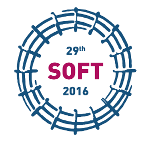Speaker
Abha Maheshwari
(In Wall Shielding)
Description
In wall Shielding blocks will be inserted between inner and outer shell on ITER Vacuum Vessel (VV) and will fill up about 60% of volume between two shells. IWS blocks comprise of number of plates stacked together with fasteners. There are two types of IWS blocks, (i) Primary IWS blocks made of Austenitic stainless steels (SS304B4 and B7) to provide neutron shielding to all components inside cryostat, particularly to Toroidal Field (TF) coils and (ii) Ferromagnetic inserts (FM) made of Ferritic steel (SS430) to reduce TF ripple at mid-plane of plasma. Critical material requirement for FM blocks to achieve 0.3% TF ripple at mid-plane is saturated magnetization which should be 1.6- 0 1.66 T at room temperature at 80,000 A/m field. SS430 is selected for FM blocks and its chemical composition is adjusted to achieve this value. Chromium was varied from 16% to 17% and this paper describes the variation in magnetic properties of SS430 with this variation in chemical composition.
Another important requirement for all non-FM blocks is that the magnetic permeability of, (i) all raw materials and (ii) of all components after machining must not exceed 1.03. During manufacturing IWS Components undergo many operations like Water Jet cutting, CNC machining, Turning, Rolling, Forging, Solution Annealing etc. which may change the magnetic properties of materials from original value of 1.03. With appropriate selection of materials of various tools and fixtures and adjusting different parameters (e.g. cutting speed, thread rolling speed, welding etc) magnetic permeability was retained to almost to its original value. This paper describes the variation in magnetic properties of IWS materials during material production as well as the machining of IWS components from these materials.
Co-authors
Abha Maheshwari
(In Wall Shielding, ITER-India, Gandhinagar, India)
Gajjar Bhoomi S
(In Wall Shielding, ITER-India, Gandhinagar, India)
Pathak Haresh A
(In Wall Shielding, ITER-India, Gandhinagar, India)

